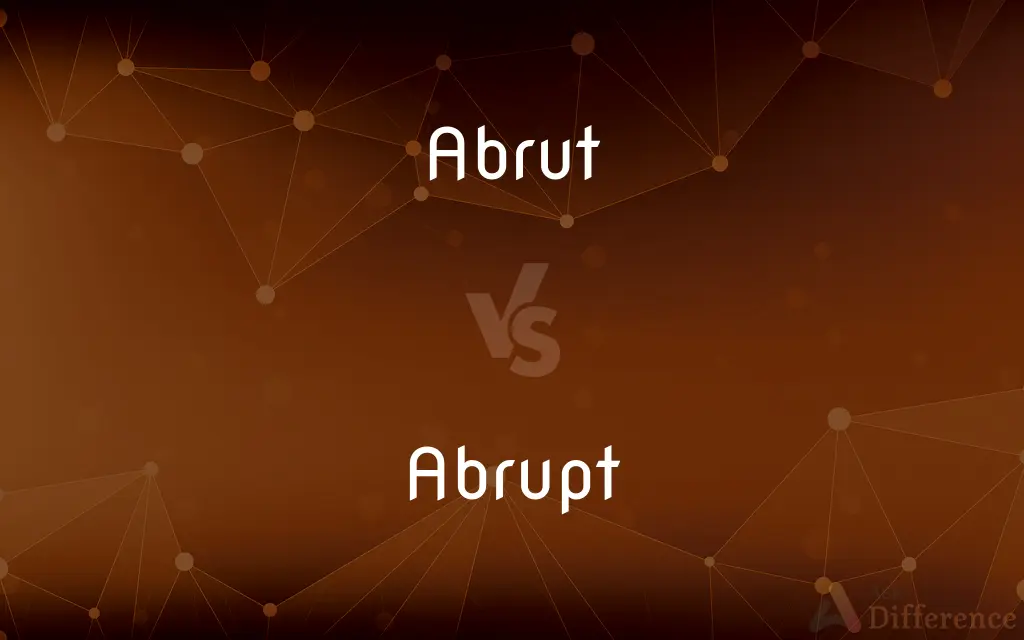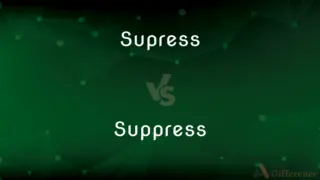Abrut vs. Abrupt — Which is Correct Spelling?
By Tayyaba Rehman — Updated on March 27, 2024
"Abrut" is an incorrect spelling, while "Abrupt" is the correct spelling, referring to something sudden or unexpected.

Table of Contents
Which is correct: Abrut or Abrupt
How to spell Abrupt?

Abrut
Incorrect Spelling

Abrupt
Correct Spelling
ADVERTISEMENT
Key Differences
"Abrupt" has a second 'p', making it distinct.
Think of "rupture" which is sudden and contains the "rupt" in "Abrupt".
Pronounce it as "ab-RUPT" to remember the 'p' sound.
Recall the phrase "an abrupt stop" to associate the meaning with the correct spelling.
Visualize someone being "interrupted" suddenly to remember the "rupt" part of "Abrupt".
ADVERTISEMENT
How Do You Spell Abrupt Correctly?
Incorrect: The car came to an abrut stop, avoiding the obstacle in the road.
Correct: The car came to an abrupt stop, avoiding the obstacle in the road.
Incorrect: The change in weather was so abrut that we all felt unprepared.
Correct: The change in weather was so abrupt that we all felt unprepared.
Incorrect: She answered the question in a very abrut manner, which seemed rude.
Correct: She answered the question in a very abrupt manner, which seemed rude.
Incorrect: The meeting came to an abrut end when the power went out.
Correct: The meeting came to an abrupt end when the power went out.
Incorrect: His abrut departure left everyone in shock.
Correct: His abrupt departure left everyone in shock.
Abrupt Definitions
Steep; almost perpendicular.
The abrupt cliff loomed overhead.
Brief to the point of rudeness.
His reply was abrupt and cold.
Unexpectedly hastened or curtailed.
The meeting had an abrupt end.
Marked by sudden changes in subject and sharp transitions.
Her abrupt change in topic surprised everyone.
Sudden and unexpected.
The car made an abrupt stop.
Unexpectedly sudden
An abrupt change in the weather.
Surprisingly curt; brusque
An abrupt answer made in anger.
Touching on one subject after another with sudden transitions
Abrupt prose.
Steeply inclined. ]
Broken away (from restraint).
Without notice to prepare the mind for the event; sudden; hasty; unceremonious.
The party came to an abrupt end when the parents of our host arrived.
Curt in manner.
Having sudden transitions from one subject or state to another; unconnected; disjointed.
(obsolete) Broken off.
Extremely steep or craggy as if broken up; precipitous.
(botany) Suddenly terminating, as if cut off; truncate.
To tear off or asunder.
To interrupt suddenly.
(poetic) Something which is abrupt; an abyss.
Broken off; very steep, or craggy, as rocks, precipices, banks; precipitous; steep; as, abrupt places.
Having sudden transitions from one subject to another; unconnected.
The abrupt style, which hath many breaches.
Suddenly terminating, as if cut off.
An abrupt place.
Marked by sudden changes in subject and sharp transitions;
Abrupt prose
Exceedingly sudden and unexpected;
Came to an abrupt stop
An abrupt change in the weather
Extremely steep;
An abrupt canyon
The precipitous rapids of the upper river
The precipitous hills of Chinese paintings
A sharp drop
Surprisingly and unceremoniously brusque in manner;
An abrupt reply
Abrupt Meaning in a Sentence
His abrupt change of topic made the conversation awkward.
The movie ended in an abrupt manner, leaving the audience surprised.
She was known for her abrupt responses during meetings.
There was an abrupt drop in temperature overnight.
The abrupt sound of the alarm woke everyone up.
The train came to an abrupt halt due to an obstacle on the tracks.
The conversation had an abrupt end when they disagreed.
The abrupt turn of the wheel avoided an accident.
The bird's flight was interrupted by an abrupt gust of wind.
The abrupt rise in prices has affected everyone.
The abrupt closure of the road caused traffic delays.
Her abrupt departure from the company was unexpected.
They noticed an abrupt change in her behavior.
The show was cancelled in an abrupt decision by the network.
There was an abrupt increase in the workload this week.
The thunderstorm was abrupt, catching many people off guard.
His abrupt laughter in the quiet room was startling.
The teacher's abrupt exit from the classroom left the students bewildered.
I was taken aback by his abrupt refusal to help.
The abrupt silence after the loud noise was eerie.
The abrupt ending of the book left many questions unanswered.
She had an abrupt way of speaking that could sometimes offend.
His mood can change in an abrupt manner, which is confusing to those around him.
The game came to an abrupt stop when it started to rain.
His abrupt arrival caught us all by surprise.
Abrupt Idioms & Phrases
Abrupt awakening
A sudden and often unpleasant realization or awareness.
Losing his job served as an abrupt awakening to the importance of saving money.
Come to an abrupt end
To suddenly stop or finish.
The party came to an abrupt end when the neighbors called the police due to noise.
Common Curiosities
What is the pronunciation of Abrupt?
Abrupt is pronounced as /əˈbrʌpt/.
What is the verb form of Abrupt?
There isn't a direct verb form for abrupt. However, "abruptly" is an adverbial form, and "interrupt" is a verb with a related concept.
Which vowel is used before Abrupt?
The letter 'a' is used before abrupt.
What is the root word of Abrupt?
The root word of abrupt is the Latin "abruptus."
Which conjunction is used with Abrupt?
Conjunction usage isn't specific to the word abrupt. Common conjunctions like "and," "or," or "but" can be used with it in sentences.
Which article is used with Abrupt?
Both definite ("the") and indefinite ("a," "an") articles can be used depending on the sentence.
Why is it called Abrupt?
Abrupt originates from the Latin word "abruptus" meaning broken off, which refers to its sense of suddenness.
Is Abrupt a negative or positive word?
It's neutral but can have negative connotations depending on context.
What is the singular form of Abrupt?
Abrupt is in its singular form.
Which preposition is used with Abrupt?
The preposition "with" can be used, as in "with abrupt force."
Is Abrupt a noun or adjective?
Abrupt is an adjective.
Is Abrupt an adverb?
No, but "abruptly" is the adverbial form.
Is Abrupt an abstract noun?
No, abrupt is an adjective.
What part of speech is Abrupt?
Abrupt is an adjective.
What is the first form of Abrupt?
Abrupt is an adjective and doesn't have verb forms.
What is the plural form of Abrupt?
Adjectives don't have plural forms. So, abrupt remains abrupt regardless of the noun it modifies.
Is Abrupt a collective noun?
No, abrupt is an adjective.
Is the Abrupt term a metaphor?
By itself, it's not a metaphor, but it can be used metaphorically in certain contexts.
Is the word Abrupt imperative?
No, abrupt is an adjective, not a verb.
What is a stressed syllable in Abrupt?
The second syllable, "-rupt," is stressed.
What is the opposite of Abrupt?
Gradual.
Is Abrupt a vowel or consonant?
Abrupt is a word, not a single letter. It contains both vowels and consonants.
Is Abrupt a countable noun?
Abrupt is not a noun; it's an adjective.
How do we divide Abrupt into syllables?
Ab-rupt.
What is another term for Abrupt?
Sudden.
Is the word Abrupt a gerund?
No, it's an adjective.
Is the word “Abrupt” a Direct object or an Indirect object?
As an adjective, abrupt cannot function as a direct or indirect object.
How many syllables are in Abrupt?
There are two syllables in abrupt.
Which determiner is used with Abrupt?
Any determiner can be used depending on the noun it modifies, such as "an," "the," "my," "this," etc.
What is the second form of Abrupt?
Abrupt doesn't have verb forms as it's an adjective.
What is the third form of Abrupt?
Abrupt doesn't have verb forms as it's an adjective.
How is Abrupt used in a sentence?
The change in weather was so abrupt that many were caught off guard.
Share Your Discovery

Previous Comparison
Sqaud vs. Squad
Next Comparison
Supress vs. SuppressAuthor Spotlight
Written by
Tayyaba RehmanTayyaba Rehman is a distinguished writer, currently serving as a primary contributor to askdifference.com. As a researcher in semantics and etymology, Tayyaba's passion for the complexity of languages and their distinctions has found a perfect home on the platform. Tayyaba delves into the intricacies of language, distinguishing between commonly confused words and phrases, thereby providing clarity for readers worldwide.


































